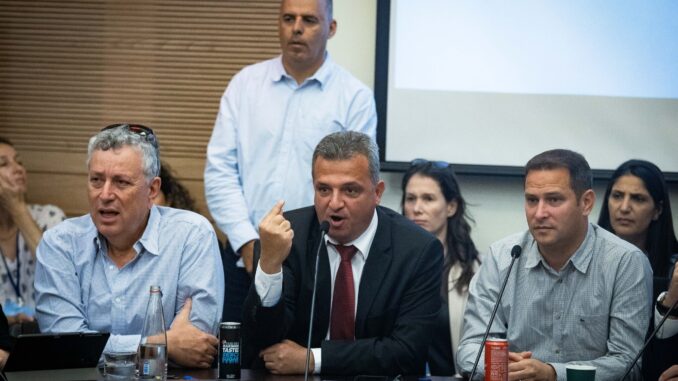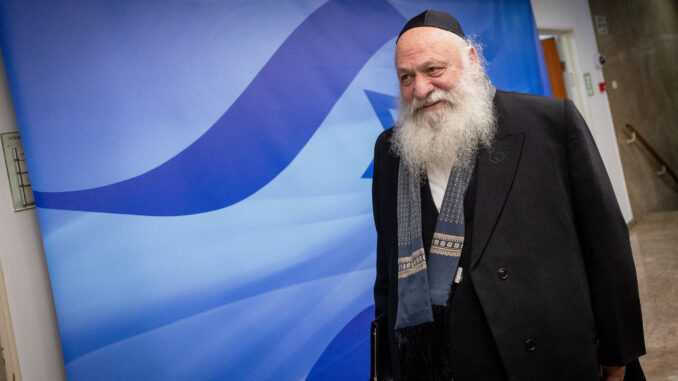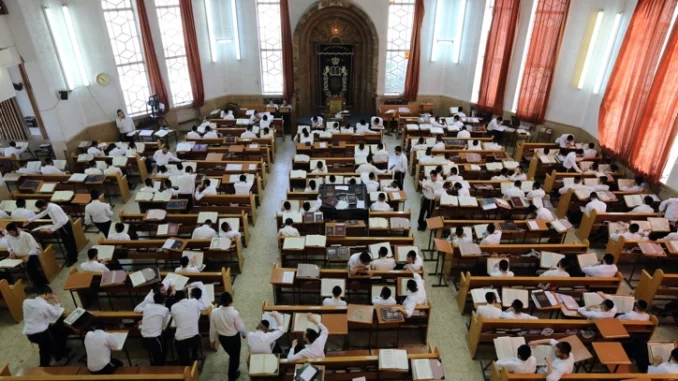T. Belman. This is another example of the left refusing to accept the results of the last election. It will go to any means to prevent the passing of the budget this month. I expect the protests to increase over the next two weeks to make it every so difficult for this government to rule.
“If passed, the Arnona Fund law would appropriate between 10% to 28% of commercial property taxes raised by municipalities, with higher income communities paying a higher rate, to support a fund which would subsidize lower income communities to encourage them to build more housing units.”
This transfer of funds from the rich communities to the poorer ones is a good policy. It will lower the cost of housing for all and will serve to decentralize Israel and support the outlining communities which everyone in Israel wants.
Schools shuttered in dozens of cities and municipal services frozen in ongoing strike protesting new city tax redistribution plan.
Israel National News May 16, 2023, 9:45 AM (GMT+3)
A strike launched Monday in protest of the government’s new city tax redistribution plan continued in major cities and towns across Israel Tuesday, leaving schools closed and municipal services out of commission.
Dozens of municipalities across the country have vowed to continue striking until this Thursday, including Tel Aviv, Ramat Gan, Givatayim, Rishon LeZion, Modi’in-Maccabim-Re’ut, Ashdod, Haifa, Kfar Saba, Herzliya, Beit Shean, Kiryat Ono, Holon, Shoham, Ra’anana, Tiberias, Or Yehuda, Petah Tikva, Kadima-Tzoren, Ramat HaSharon, Hod HaSharon, Ganei Tikva, Nesher, Yokneam, and Ramla, while the municipality of Jerusalem has announced that it will not join the strike.
As part of the strike, municipal offices will not be open to the public nor will they receive telephone calls. Garbage collection and street cleaning services provided by municipal workers have also been suspended. Schools and daycare centers have also been shutter, though special education services continue to operate.
On Monday, the Knesset Finance Committee approved the so-called “Arnona Fund” bill, sending it to the Knesset plenum for its second and third readings next week.
If passed, the Arnona Fund law would appropriate between 10% to 28% of commercial property taxes raised by municipalities, with higher income communities paying a higher rate, to support a fund which would subsidize lower income communities to encourage them to build more housing units.
Municipal leaders and Opposition lawmakers have decried the law as a stealth tax on Israelis that would deprive cities of much-needed revenue.
“This law is not acceptable to the Federation of Local Authorities,” said Modi’in-Maccabim-Reut Mayor Haim Bibas on Sunday. “We oppose it and have opposed it from the beginning. It is contrary to any concept of municipal rule and central government-municipal government relations.”
“We would be very happy if this chapter were to be removed from the agenda without votes – and forgotten by history. But we all understand that the game is rigged in advance by the automatic coalition majority. With this understanding, we acted in every possible way to reduce and minimize the damages caused as a result of this bill – and the result is this compromise that is now being presented in the committee that I wish had never come here at all.”
***
Municipal leaders of Givatayim and Ramat Gan say they’ll take matter to court; strike continues, but children return to school; protesters rally outside housing minister’s home
Today, at 2:58 pm

The Brothers in Arms protest outside the home of Housing Minister Yitzhak Goldknopf in Jerusalem, May 16, 2023 (Yonatan Sindel/Flash90)
The mayors of two central cities warned Tuesday that they would not comply with the government’s plan to redistribute local tax funds to poorer municipalities.
The plan will take a percentage of property taxes collected by municipal authorities from local businesses, to be put into a fund that will go to help municipalities that have more modest commercial activity and are located farther from Israel’s center.
Critics accuse the coalition of planning to use the funds to pay for sectoral demands made by coalition partners, like subsidies to the ultra-Orthodox.
They also note that settlements in the West Bank are exempt from contributing to the fund, and that it is structured in a way that makes Arab municipalities less likely to benefit.
Givatayim Mayor Ran Kunik said he would file a petition with the High Court if the city is asked to put funds into the pot, which he said had “many legal flaws.”
“We will not transfer the money to the property tax fund. We will take this all the way,” Kunik told Radio 103FM.
Dozens of municipalities launched a strike on Monday, closing schools and suspending garbage collection and welfare services to protest the so-called Arnona Fund plan. Arnona is property tax, set and managed by each municipality.
The strike continued Tuesday, but with schools and kindergartens open.
Kunik said that the “mayors are stuck between a rock and a hard place,” with residents understanding the need to fight the plan but also having little patience for strikes.
He also pushed back against the claim that the strike was a “settling of scores” by local authorities angered over by the government’s contentious judicial overhaul.
“This [plan] has been a dream of treasury officials for a number of years. It’s not a new invention,” Kunik said. “[Finance Minister Bezalel] Smotrich simply recognized an opportunity.”
“[Smotrich] also excluded the [West Bank] settlements — how is it possible that the settlements do not need to set aside a single shekel for the property tax fund? But can they can receive from it?” Kunik charged.

Ramat Gan Mayor Carmel Shama- Hacohen speaks at a Knesset Finance Committee meeting on May 14, 2023. (Oren Ben Hakoon/Flash90)
The sentiment was echoed by Ramat Gan Mayor Carmel Shama-Hacohen, who was asked whether he would refuse to transfer money to the fund.
“Do you think we are sheep? If there’s a law, they can bring it to court,” he told Army Radio.
On Monday, Labor MK Gilad Kariv threatened to petition the High Court of Justice against the plan, saying it was engineered to send the majority of the funds to ultra-Orthodox communities and not to Arab towns, which also suffer from financial hardships.
Backers of the plan say it will help less wealthy municipalities incentivize residential real estate instead of business — though businesses pay more tax and are therefore currently more attractive to municipal authorities — and have put an emphasis on the fund helping to build communities far from Israel’s center.
However, detractors say that in addition to the discrimination between municipalities, it punishes communities that have already invested in attracting employers, and takes money that would otherwise be directed toward improving services, such as education and culture.
As it currently stands, the law will disproportionately affect cities with thriving business areas or industrial parks.
On Monday, Opposition Leader Yair Lapid slammed the plan as “daylight robbery” and called on the government to draw up a plan that would help all struggling communities.
National Unity leader Benny Gantz slammed it as an “outrageous injustice” that will have to be “paid for by residents of south Tel Aviv,” generally considered to be a poorer section of the wealthy municipality.
Hours later, the plan was approved in a vote of the Knesset Finance Committee after a stormy session that saw lawmakers scuffle, with a number of them forcibly removed from the meeting.
The plan will now advance alongside the budget to the Knesset floor.
***
Mathematics and Louis Vuitton
On Tuesday morning, dozens of reservists protested outside the Jerusalem home of Housing Minister Yitzhak Goldknopf, decrying the government decision to earmark large swaths of funds to the demands of coalition members, in addition to the so-called Arnona Fund.

Housing and Construction Minister Yitzhak Goldknopf arrives for a meeting at the Prime Minister’s Office in Jerusalem on January 3, 2023. (Yonatan Sindel/Flash90)<
>
<
>
The group chanted outside the United Torah Judaism leader’s home, with a banner quoting his claim last year that “mathematics does not contribute to the economy.”
The protesters also made a display of Louis Vuitton bags full of replica money.
The minister — who has been accused of using a Haredi educational network to enrich his family with public funds, and is accused of illegally dividing an apartment in his property empire into five further units — was photographed in February, apparently alongside an aide carrying a number of bags containing purchases from the luxury brand.
“The extremist government robs the public purse, scatters coalition funds to please its extortionist partners, and tries to control property tax resources,” the Brothers in Arms protest movement said in a statement. “Minister Goldknopf is the richest minister in Israel, destroying the future of his constituents, and stealing from the population he serves.”
In addition to the plan to transfer the municipal taxes, the coalition on Sunday approved NIS 13.7 billion ($3.7 billion) worth of coalition funds mainly allocated in support of ultra-Orthodox institutions and causes.
Ahead of Sunday’s cabinet vote, the Finance Ministry’s Budgets Department head Yogev Gardos warned that the allocation creates negative incentives for Haredi men to seek employment and will harm the labor market and the economy as a whole.
Furthermore, Gardos cautioned, if more Haredi men are not encouraged to work, by 2065 the government will have to increase direct taxes by 16 percent to maintain the same level of services that it provides without increasing the deficit.
Ultra-Orthodox Jewish men study in the Lithuanian Slabodka yeshiva in the ultra-Orthodox city of Bnei Brak, July 8, 2013. (Yaakov Naumi/Flash90)<
>
<
>
Israel’s ultra-Orthodox population is expected to grow from 13.5% of the total population currently to 16% in 2030. The ultra-Orthodox population’s current growth rate of 4% is the fastest of any group in Israel, according to Central Bureau of Statistics data.
On Monday it was revealed that some of the money was additionally earmarked for a number of controversial projects including a heritage center dedicated to Rehavam “Gandhi” Ze’evi, a far-right IDF general and minister who was assassinated by Palestinian terrorists in 2001.
Ze’evi has become increasingly controversial in recent years following an investigative TV report in 2016 that aired allegations of rape and intimidation against him, with some calling to scrap the official state commemorations for him.
<
>
<
>
<
>
<
>
<
>




Leave a Reply
You must be logged in to post a comment.